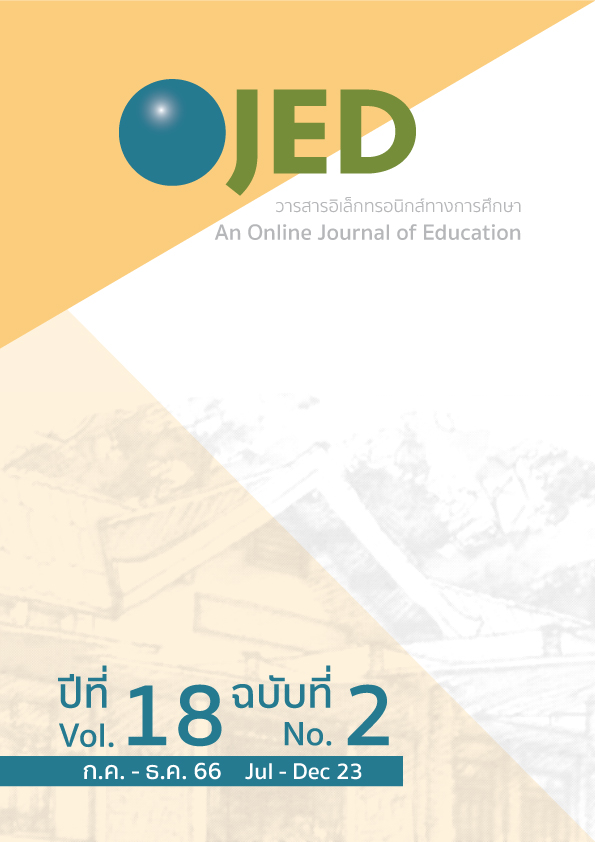Development of Biological Board Game in Immune System to Enhance Critical Thinking Ability for Upper Secondary School Students
DOI:
https://doi.org/10.14456/ojed.2023.12Keywords:
biological board game, immune system, critical thinking abilityAbstract
The objectives of this research were: 1) to investigate the problems and needs associated with using a biology board game on the immune system, 2) to develop a biology board game on the immune system, and 3) to compare the results of using a biology board game on the immune system to promote high school students’ critical thinking abilities. The sample used in this research was divided into two groups: 108 biology teachers and 50 secondary students under the Bangkok Metropolitan Administration’s Office of Basic Education Commission from multi-stage sampling. Data were collected through a questionnaire and a critical thinking ability test, and were analyzed using mean, percentage, standard deviation, and dependent sample t-test. The research findings were as follows: 1) The majority of biology teachers stated that their school has the required facilities and time available and attach great importance to developing students’ decision-making ability. 2) The biology board game on the immune system that was developed was a negotiation and deduction board game. It contains important components, including the player’s role, the game situation, feedback to the player, and a conclusion. 3) The students’ critical thinking ability scores after using the biology board game were significantly higher than before at the .05 level of confidence.
References
ภาษาไทย
จินตวีร์ คล้ายสังข์. (2560). การผลิตและใช้สื่ออย่างเป็นระบบเพื่อการเรียนรู้ในศตวรรษที่ 21 (พิมพ์ครั้งที่ 1.). กรุงเทพฯ: สำนักพิมพ์แห่งจุฬาลงกรณ์มหาวิทยาลัย.
ทิศนา แขมมณี. (2562). ศาสตร์การสอน: องค์ความรู้เพื่อการจัดกระบวนการเรียนรู้ที่มีประสิทธิภาพ
(พิมพ์ครั้งที่ 22). กรุงเทพฯ: สำนักพิมพ์จุฬาลงกรณ์มหาวิทยาลัย.
ธีรภาพ แซ่เชี่ย. (2560). การใช้บอร์ดเกมประเภทวางแผนเพื่อพัฒนาทักษะการคิดอย่างมีวิจารณญาณในนักเรียนระดับมัธยมศึกษาชั้นปีที่ 3 ในโรงเรียนขนาดใหญ่ สังกัดสำนักงานเขตการศึกษาขั้นพื้นฐาน จังหวัดปทุมธานี. (วิทยานิพนธ์ศึกษาศาสตร์มหาบัณฑิต. สาขาวิชาวิทยาการเรียนรู้และนวัตกรรมการศึกษามหาวิทยาลัยธรรมศาสตร์).
สำนักงานเลขาธิการสภาการศึกษา. (2563). สภาวะการศึกษาไทย 2561/2562 การปฏิรูปการศึกษาในยุคดิจิทัล. กรุงเทพฯ: สำนักงานเลขาธิการสภาการศึกษา. สืบค้นจาก
https://online.fliphtml5.com/wbpvz/ydoe/#p=1
อุไร จักษ์ตรีมงคล. (2557) การพัฒนาแบบวัดทักษะการคิดสำหรับการประเมินคุณภาพผู้เรียนระดับชั้นมัธยมศึกษาปีที่ 6. วารสารวิจัยทางการศึกษาคณะศึกษาศาสตร์ มหาวิทยาลัยศรีนครินทรวิโรฒ, 9(1).
ภาษาอังกฤษ
Bandura, A. (2008). Observational learning. The international encyclopedia of communication.
Binmore, K. (2007). Game theory: a very short introduction. OUP Oxford.
Cicchino, M. I. (2013). Using game-based learning to foster critical thinking in student discourse. Rutgers The State University of New Jersey, School of Graduate Studies.
Dwyer, C. P. (2017). Critical thinking: Conceptual perspectives and practical guidelines. Cambridge University Press.
Hinebaugh, J. P. (2009). A board game education. R&L Education.
Jimenez, S. (2013). Gamification Model Canvas. Retrieved November 20, 2020 from https://www.gamasutra.com/blogs/SergioJimenez/20131106/204134/ Gamification_Model_Canvas.php
Johnson, D. W., Johnson, R. T., & Smith, K. A. (2014). Cooperative learning: Improving university instruction by basing practice on validated theory. Journal on Excellence in University Teaching, 25(4), 1-26.
Kammanee, T. (2019). Teaching science: Knowledge for effective learning process.
(22nd Ed.). Bangkok: Chulalongkorn University Press. [In Thai]
Khlaisang, J. (2017). Systematic designing and use of media for teaching 21st century
skills. (1st Ed.). Bangkok: Chulalongkorn University Press. [In Thai]
Lai, E. R. (2011). Critical thinking: A literature review. Pearson's Research Reports, 6(1), 40-41.
McLeod, S. A. (2018). Skinner - operant conditioning. https://www.simplypsychology.org/operant-conditioning.html
Noda, S., Shirotsuki, K., & Nakao, M. (2019). The effectiveness of intervention with board games: a systematic review. BioPsychoSocial medicine, 13(1), 1-21.
Office of the Education Council (2020). The 2018/2019 Thailand education situation
report: education reform in digital era. Office of the Education Council. Retrieved from https://online.fliphtml5.com/wbpvz/ydoe/#p=1 [In Thai]
Saechia, T. (2017). Using strategy-based board games to develop the critical thinking
skills of 9th grade students in large-sized schools of the Basic Education Commission of Pathum Thani. (Master Thesis). Bangkok: Thammasat University. [In Thai]
Wardani, S., Lindawati, L., & Kusuma, S. (2017). The development of inquiry by using android-system-based chemistry board game to improve learning outcome and critical thinking ability. Jurnal Pendidikan IPA Indonesia, 6(2), 196-205.
World Economic Forum. (2019). The Global Competitiveness Report 2019 . World Economic Forum.
http://www3.weforum.org/docs/WEF_TheGlobalCompetitiveness Report20
Downloads
Published
How to Cite
Issue
Section
License
Copyright (c) 2023 An Online Journal of Education

This work is licensed under a Creative Commons Attribution-NonCommercial-NoDerivatives 4.0 International License.




